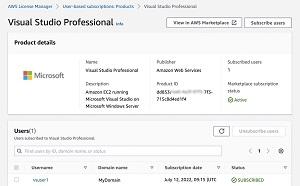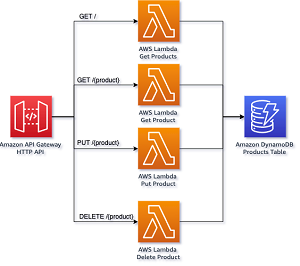News
EC2-Based Visual Studio 2022 and Lambda TypeScript Tools Arrive
Cloud giant Amazon Web Services (AWS) recently unveiled two new offerings that have reached general availability: Visual Studio 2022 on Amazon EC2 and AWS Lambda Powertools for TypeScript.
The former provides a per-user subscription model for Visual Studio Professional 2022 and Visual Studio Enterprise 2022 software running on the AWS cloud.
The Visual Studio software running on EC2 instances comes with preconfigured Amazon Machine Images (AMIs) of Visual Studio, AWS said in its Aug. 2 announcement post.
 [Click on image for larger view.] Visual Studio Software on Amazon EC2 (source: AWS).
[Click on image for larger view.] Visual Studio Software on Amazon EC2 (source: AWS).
"Amazon EC2 provides a broad choice of instances, and customers not only have the flexibility of paying for what their end users use but can also provide the capacity and right hardware to their end users," the cloud giant said. "You can simply launch EC2 instances using license-included AMIs, and multiple authorized users can connect to these EC2 instances by using Remote Desktop software. Your administrator can authorize users centrally using AWS License Manager and AWS Managed Microsoft Active Directory (AD)."
The License Manager can help developers manage software licenses from various vendors -- including Microsoft, SAP, Oracle and IBM -- across AWS and on-premises environments. In addition, users can remotely connect to Visual Studio instances using their AD account information shared by administrators via Remote Desktop software.
The VS 2022 software service is now available in all AWS commercial and public Regions.
AWS Lambda Powertools for TypeScript
This is used in serverless computing, where blocks of code, or functions, are executed in response to events generated by systems or users.
The idea is to help developers implement architectural best practices for using AWS Lambda functions. Specifically, those best practices for designing and operating reliable and secure systems in the AWS cloud come from the AWS Well-Architected Framework and the cloud platform's Serverless Lens.
AWS said following such best practices can reduce the amount of boilerplate code that developers need to write, while also lessening the number of bugs and accelerating remediation and speeding up the application lifecycle into production. Other benefits listed by AWS include mitigating deployment risks, offering more accurate production-readiness assessments and fostering more informed decisions to deploy systems and changes.
The company recently announced the latest new product, AWS Lambda Powertools for Typescript, following similar Powertools offerings for Python and Java. Like those others, the TypeScript-centric package provides a library of utilities for AWS Lambda functions running on the Node.js runtime to ease the adoption of best practices such as tracing, structured logging, custom metrics and so on. It works with both JavaScript and TypeScript code bases.
 [Click on image for larger view.] Serverless TypeScript Demo Application (source: AWS).
[Click on image for larger view.] Serverless TypeScript Demo Application (source: AWS).
Tenets of the Powertools offering as listed by AWS include:
- AWS Lambda only. We optimize for AWS Lambda function environments and supported runtimes only. Utilities might work with web frameworks and non-Lambda environments, though they are not officially supported.
- Eases the adoption of best practices. The main priority of the utilities is to facilitate best practices adoption, as defined in the AWS Well-Architected Serverless Lens; all other functionality is optional.
- Keep it lean. Additional dependencies are carefully considered for security and ease of maintenance, and prevent negatively impacting startup time.
- We strive for backwards compatibility. New features and changes should keep backwards compatibility. If a breaking change cannot be avoided, the deprecation and migration process should be clearly defined.
- We work backwards from the community. We aim to strike a balance of what would work best for 80 percent of customers. Emerging practices are considered and discussed via Requests for Comment (RFCs)
- Progressive. Utilities are designed to be incrementally adoptable for customers at any stage of their Serverless journey. They follow language idioms and their community's common practices.
The TypeScript tools are the latest AWS products and services catering to Microsoft-centric developers, with the most recent examples covered in the articles "AWS Eases .NET App Deployment," published last month, and April's "AWS Launches Preview of .NET Annotations Lambda Framework."
About the Author
David Ramel is an editor and writer at Converge 360.